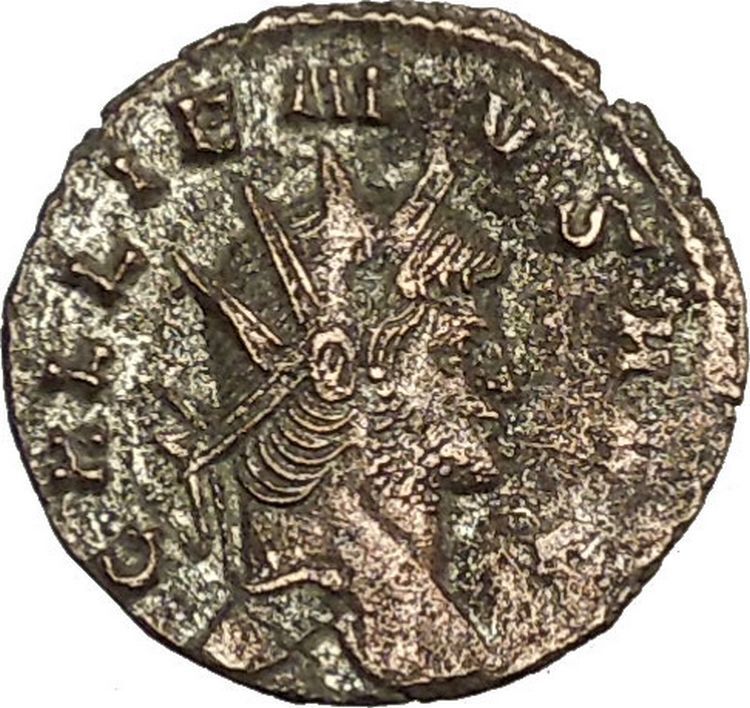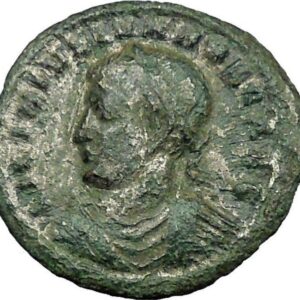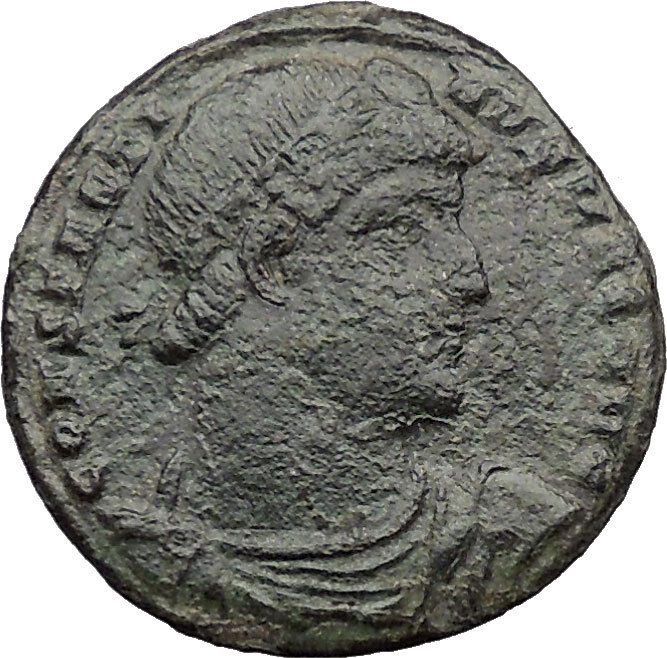|
Gordian III – Roman Emperor: 238-244 A.D.
Silver Antoninianus 22mm (4.47 grams) Antioch mint: 243-244 A.D.
Reference: RIC 213, C 167
IMP GORDIANVS PIVS FEL AVG – Radiate, draped and cuirassed bust right.
ORIENS AVG – Sol standing left, raising hand and holding globe.
You are bidding on the exact item pictured, provided with a Certificate of Authenticity and Lifetime Guarantee of Authenticity.
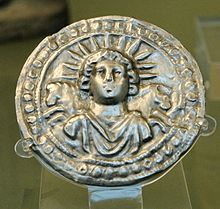 Sol Invictus (“Unconquered Sun”) was the official sun god of the later Roman Empire and a patron of soldiers. In 274 the Roman emperor Aurelian made it an official cult alongside the traditional Roman cults. Scholars disagree whether the new deity was a refoundation of the ancient Latin cult of Sol, a revival of the cult of Elagabalus or completely new.The god was favored by emperors after Aurelian and appeared on their coins until Constantine.The last inscription referring to Sol Invictus dates to 387 AD and there were enough devotees in the 5th century that Augustine found it necessary to preach against them. It is commonly claimed that the date of 25 December for Christmas was selected in order to correspond with the Roman festival of Dies Natalis Solis Invicti, or “Birthday of the Unconquered Sun”, but this view is challenged. Sol Invictus (“Unconquered Sun”) was the official sun god of the later Roman Empire and a patron of soldiers. In 274 the Roman emperor Aurelian made it an official cult alongside the traditional Roman cults. Scholars disagree whether the new deity was a refoundation of the ancient Latin cult of Sol, a revival of the cult of Elagabalus or completely new.The god was favored by emperors after Aurelian and appeared on their coins until Constantine.The last inscription referring to Sol Invictus dates to 387 AD and there were enough devotees in the 5th century that Augustine found it necessary to preach against them. It is commonly claimed that the date of 25 December for Christmas was selected in order to correspond with the Roman festival of Dies Natalis Solis Invicti, or “Birthday of the Unconquered Sun”, but this view is challenged.
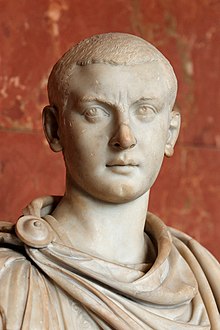
Gordian III – Roman Emperor: 238-244 A.D.
Caesar: 238 A.D. (under Balbinus and Pupienus)
Augustus: 238-244 A.D.
| Grandson of Gordian I | Nephew of Gordian II | Adopted Successor of Balbinus and Pupienus | Husband of Tranquillina |
Marcus Antonius Gordianus Pius (January 20, 225 – February 11, 244), known in English as Gordian III, was Roman Emperor from 238 to 244. Gordian was the son of Antonia Gordiana and his father was an unnamed Roman Senator who died before 238. Antonia Gordiana was the daughter of Emperor Gordian I and younger sister of Emperor Gordian II. Very little is known on his early life before becoming Roman Emperor. Gordian had assumed the name of his maternal grandfather in 238.
Following the murder of emperor Alexander Severus in Moguntiacum (modern Mainz), the capital of the Roman province Germania Inferior, Maximinus Thrax was acclaimed emperor, despite strong opposition of the Roman senate and the majority of the population. In response to what was considered in Rome as a rebellion, Gordian’s grandfather and uncle, Gordian I and II, were proclaimed joint emperors in the Africa Province. Their revolt was suppressed within a month by Cappellianus, governor of Numidia and a loyal supporter of Maximinus Thrax. The elder Gordians died, but public opinion cherished their memory as peace loving and literate men, victims of Maximinus’ oppression.
Meanwhile, Maximinus was on the verge of marching on Rome and the Senate elected Pupienus and Balbinus as joint emperors. These senators were not popular men and the population of Rome was still shocked by the elder Gordian’s fate, so that the Senate decided to take the teenager Gordian, rename him Marcus Antonius Gordianus as his grandfather, and raise him to the rank of Caesar and imperial heir. Pupienus and Balbinus defeated Maximinus, mainly due to the defection of several legions, namely the ParthicaII who assassinated Maximinus. But their joint reign was doomed from the start with popular riots, military discontent and even an enormous fire that consumed Rome in June 238. On July 29, Pupienus and Balbinus were killed by the Praetorian guard and Gordian proclaimed sole emperor.
Rule
Due to Gordian’s age, the imperial government was surrendered to the aristocratic families, who controlled the affairs of Rome through the senate. In 240, Sabinianus revolted in the African province, but the situation was dealt quickly. In 241, Gordian was married to Furia Sabinia Tranquillina, daughter of the newly appointed praetorian prefect, Timesitheus. As chief of the Praetorian guard and father in law of the emperor, Timesitheus quickly became the de facto ruler of the Roman empire.
In the 3rd century, the Roman frontiers weakened against the Germanic tribes across the Rhine and Danube, and the Sassanid kingdom across the Euphrates increased its own attacks. When the Persians under Shapur I invaded Mesopotamia, the young emperor opened the doors of the Temple of Janus for the last time in Roman history, and sent a huge army to the East. The Sassanids were driven back over the Euphrates and defeated in the Battle of Resaena (243). The campaign was a success and Gordian, who had joined the army, was planning an invasion of the enemy’s territory, when his father-in-law died in unclear circumstances. Without Timesitheus, the campaign, and the emperor’s security, were at risk.
Marcus Julius Philippus, also known as Philip the Arab, stepped in at this moment as the new Praetorian Prefect and the campaign proceeded. In the beginning of 244, the Persians counter-attacked. Persian sources claim that a battle was fought (Battle of Misiche) near modern Fallujah (Iraq) and resulted in a major Roman defeat and the death of Gordian III. Roman sources do not mention this battle and suggest that Gordian died far away, upstream of the Euphrates. Although ancient sources often described Philip, who succeeded Gordian as emperor, as having murdered Gordian at Zaitha (Qalat es Salihiyah), the cause of Gordian’s death is unknown.
Gordian’s youth and good nature, along with the deaths of his grandfather and uncle and his own tragic fate at the hands of another usurper, granted him the everlasting esteem of the Romans. Despite the opposition of the new emperor, Gordian was deified by the Senate after his death, in order to appease the population and avoid riots.
|





 Sol Invictus (“Unconquered Sun”) was the official sun god of the later Roman Empire and a patron of soldiers. In 274 the Roman emperor Aurelian made it an official cult alongside the traditional Roman cults. Scholars disagree whether the new deity was a refoundation of the ancient Latin cult of Sol, a revival of the cult of Elagabalus or completely new.The god was favored by emperors after Aurelian and appeared on their coins until Constantine.The last inscription referring to Sol Invictus dates to 387 AD and there were enough devotees in the 5th century that Augustine found it necessary to preach against them. It is commonly claimed that the date of 25 December for Christmas was selected in order to correspond with the Roman festival of Dies Natalis Solis Invicti, or “Birthday of the Unconquered Sun”, but this view is challenged.
Sol Invictus (“Unconquered Sun”) was the official sun god of the later Roman Empire and a patron of soldiers. In 274 the Roman emperor Aurelian made it an official cult alongside the traditional Roman cults. Scholars disagree whether the new deity was a refoundation of the ancient Latin cult of Sol, a revival of the cult of Elagabalus or completely new.The god was favored by emperors after Aurelian and appeared on their coins until Constantine.The last inscription referring to Sol Invictus dates to 387 AD and there were enough devotees in the 5th century that Augustine found it necessary to preach against them. It is commonly claimed that the date of 25 December for Christmas was selected in order to correspond with the Roman festival of Dies Natalis Solis Invicti, or “Birthday of the Unconquered Sun”, but this view is challenged.


